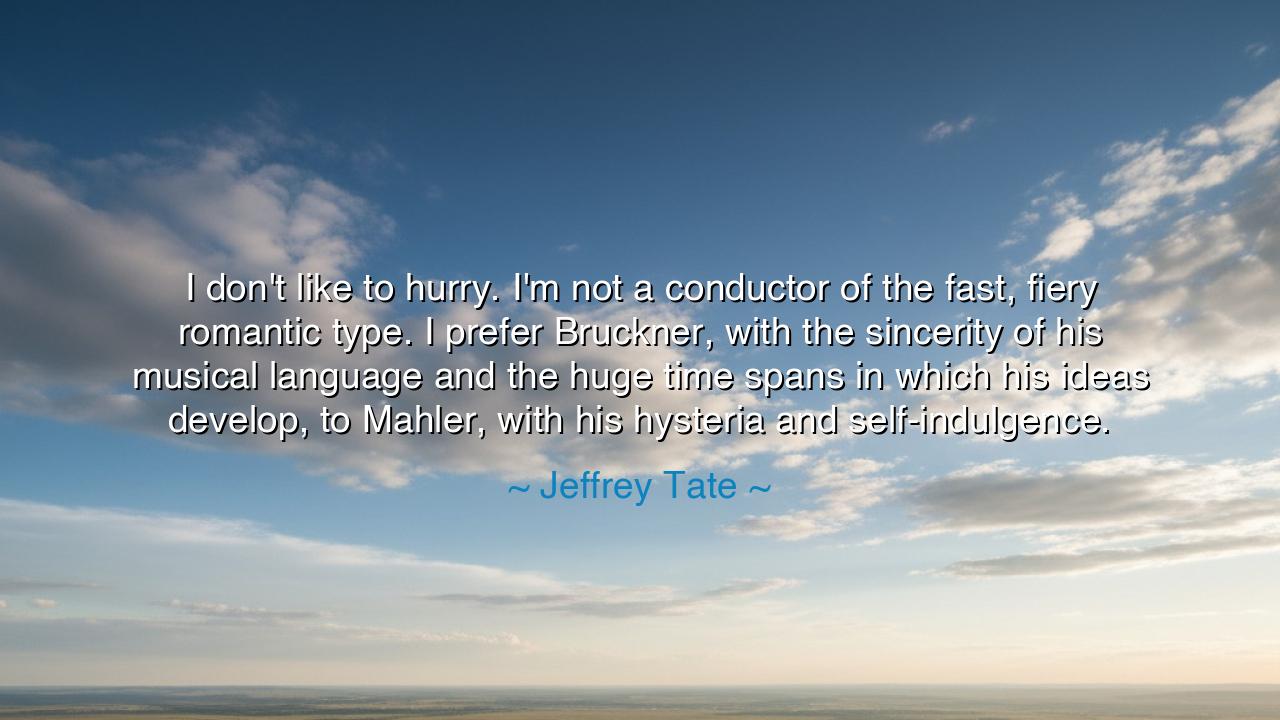
I don't like to hurry. I'm not a conductor of the fast, fiery
I don't like to hurry. I'm not a conductor of the fast, fiery romantic type. I prefer Bruckner, with the sincerity of his musical language and the huge time spans in which his ideas develop, to Mahler, with his hysteria and self-indulgence.






Jeffrey Tate, master of baton and silence, once declared: “I don’t like to hurry. I’m not a conductor of the fast, fiery romantic type. I prefer Bruckner, with the sincerity of his musical language and the huge time spans in which his ideas develop, to Mahler, with his hysteria and self-indulgence.” These words are not simply the reflections of a conductor upon two composers—they are a philosophy of life. For Tate speaks not only of music but of the soul’s approach to time, passion, and truth. He reveals that there is greatness not only in fire, but also in patience; not only in storm, but also in the slow unfolding of eternity.
The ancients understood this contrast well. In Homer’s tales, Achilles burns like fire—swift, furious, glorious, but consumed by his own intensity. Yet Odysseus endures like the sea—measured, patient, steady, and by his perseverance he returns home. Tate’s preference for Bruckner over Mahler echoes this eternal choice: shall one live by sudden bursts of emotion, or by the slow architecture of time? To choose the latter is not to despise passion, but to favor depth over spectacle, sincerity over hysteria.
Bruckner, the humble Austrian, built his symphonies as cathedrals of sound. His works did not rush; they rose brick by brick, idea by idea, until they became vast spaces in which the listener could dwell. His sincerity lay in this: that he did not seek to impress with brilliance, but to reveal the timeless rhythms of the soul. In contrast, Mahler, brilliant though he was, poured his storms into the music—his fears, his ambitions, his anxieties. His symphonies dazzled, but they also trembled with self-indulgence. Tate, in his wisdom, chose the music that mirrored his own spirit: expansive, patient, unhurried, sincere.
Consider the story of Anton Bruckner himself. A man mocked in his time, called awkward, provincial, even clumsy, he nevertheless persisted. He wrote symphonies so vast that many could not understand them, yet he believed in their truth. Only later did the world recognize that he had carved not mere notes but monuments—temples of sound that carried eternity within them. His life teaches us that to be slow is not to be weak, and to be sincere is not to be naïve. In his huge time spans, Bruckner carved permanence, while others chased applause.
Tate’s words also remind us of our own age, where all things are hurried. We live in haste, we consume in haste, we love in haste. But wisdom whispers otherwise: slow down, for only what unfolds with patience can take root. Just as Bruckner’s symphonies demand time to reveal their grandeur, so too does the soul demand time to grow into wisdom. Hurry may dazzle the crowd, but sincerity endures when the noise fades.
The lesson is clear: do not seek always the fire of immediate passion. It may burn brightly, but it often consumes itself. Instead, cultivate depth, patience, and sincerity. Let your life be a symphony that builds like Bruckner’s—grand, expansive, unafraid of silence. Do not fear being misunderstood at first, for truth often requires time to be heard. Remember: the seeds of sincerity bear fruit slowly, but their harvest endures through generations.
So I say unto you: live not as the hurried conductor, but as the patient builder of harmonies. Let your words, your deeds, your loves, be sincere and unhurried. Seek not hysteria, but truth. For as Jeffrey Tate reminds us, the greatest music—and the greatest life—is not that which burns itself away in passion’s frenzy, but that which, like Bruckner’s, grows vast and eternal, unfolding across the immense spans of time.






AAdministratorAdministrator
Welcome, honored guests. Please leave a comment, we will respond soon